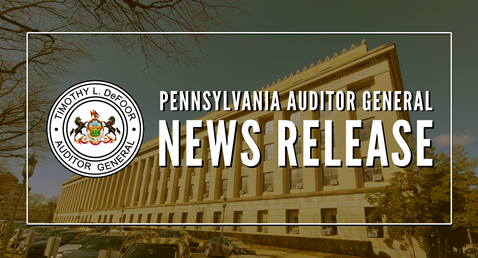Auditor General DePasquale Gives Reading School District Failing Grade
Identifies Dysfunction, Lack of Cooperation and Professional Standards
Auditor General DePasquale
Gives Reading School District Failing Grade
Identifies Dysfunction, Lack of
Cooperation and Professional Standards
READING (May 3, 2013) – Auditor General Eugene DePasquale today said that immediate and significant changes are needed at the Reading School District in Berks County, where auditors found the district has dysfunctional management, is not properly educating students, lacks controls over the spending of tax dollars, and fails to adequately restrict access to sensitive computer data, among other issues.
“To be direct, the Reading School District has failed. It has failed the children of the city and it has failed the taxpayers,” DePasquale said during a news conference in downtown Reading. “For the sake of the children of the City of Reading and the taxpayers who pour millions of dollars into this district, I have one message to the school board and to the administration: get your house in order and do it now.”
The most recent audit found significant incidents of noncompliance with state laws and administrative procedures. Specifically, auditors found that the Reading School District:
- Failed to effectively educate the district’s students to achieve targeted graduation and academic performance. For example the district’s graduation rate for the 2011-12 school year was 24 percentage points below the state goal (61 percent versus 85 percent) and the district scored 45 percent in reading proficiency and 57 percent in math proficiency while the statewide goals were 81 percent and 78 percent, respectively.
- Failed its core mission to educate children and properly handle taxpayer funds because of ineffective management and school board oversight. Specifically, the district’s management failed to establish a strong accountability system for ensuring the district was implementing school board strategy and the school board failed to monitor whether management was accomplishing its goals.
- Failed to maintain a stable upper management — since July 2005, the district had four superintendents (two permanent and two acting), four business managers (three permanent, one acting) and two assistant business managers.
- Failed to have policies and procedures in place to oversee its accounting process, which resulted in the erroneous double recording of the receipt of $15.6 million in basic education funding in 2011; an inability to immediately know what bills were paid or unpaid and multiple budgeting errors resulting in significant variances that left the district unable to manage its accounts, or determine purposes of expenditures.
- Failed to have proper password update procedures in place to prevent unauthorized access to sensitive computer files.
- Failed to obtain timely updates of an agreement with pertinent police departments regarding jurisdiction over procedures to be followed in case of an incident on school property.
- Failed to properly monitor professional employee certifications, which may result in possible state subsidy forfeiture.
“I want to make it clear — these problems are not the fault of students or teachers,” DePasquale said. “The responsibility for this debacle lies squarely upon the shoulders of the school board and many in the administration. The miscommunication between those groups must end. The future of Reading’s children, and ultimately the future of the entire city, is at peril.”
To resolve the issues identified in the audit, DePasquale recommended numerous policy and procedural changes, including:
- Complete and institute an action plan to ensure that schools have adequate resources and procedures in place to enable students to meet academic goals and graduation rates;
- Immediately prepare and adopt accounting and documentation procedures for reconciling cash receipts and revenue accounts;
- Hold management accountable for properly implementing the school board’s policies and regularly monitor management’s performance while the school board encourages and supports the stability of the management team;
- Implement security controls for the district’s computer records, including student and other sensitive information; and
- Update on a timely basis all agreements with law enforcement and first-responder organizations to ensure a coordinated and effective response to any safety emergencies.
DePasquale noted that because of the seriousness of the findings in the audit, the Department of the Auditor General will closely monitor the actions of the school district and will request an update on its corrective action progress in six months.
The department’s Bureau of School Audits examines the records of school districts, charter schools, intermediate units, and area vocational-technical schools. The audits — among other things — assess whether or not school districts received the state subsidies and reimbursements to which they were entitled, accurately managed taxpayer funds, and complied with ethics codes.
The audits also determine whether or not teachers and administrators were properly certified for the positions they held during the audit period.
A full copy of the Reading School District audit is online at: www.PaAuditor.gov/audit-reports.
# # #
Return to search results